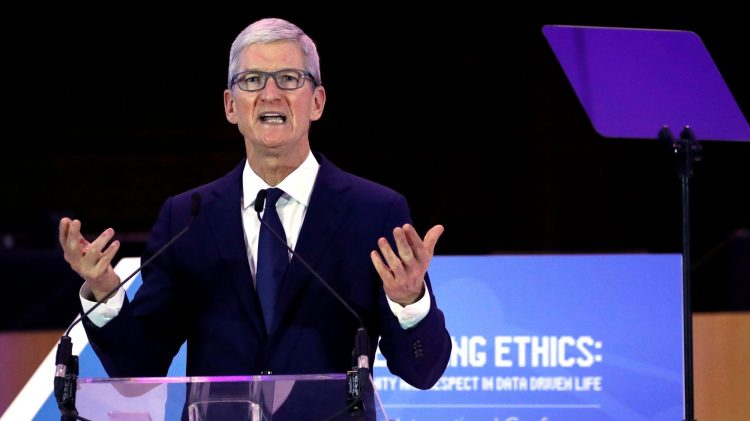The threat of significant U.S. tariffs on Chinese-manufactured goods has weighed on Apple’s stock for months, raising the prospect that its already expensive devices could see 10% to 25% cost hikes. But a last-minute reprieve delayed a new 10% tariff on phones and laptops until after the heat of the holiday shopping season, and the reason is now clear: President Donald Trump said today that he felt obliged to help Apple CEO Tim Cook because of their personal relationship.
In earlier times with different presidents, the idea of a U.S. commerce policy changing based on a conversation with one company’s CEO would have been harder to imagine, if not downright scandalous, but openly personal rather than ethical or politically calculated decision-making has become par for the course in the Trump era. Leaving no ambiguity as to his process, Trump told reporters (via CNBC) today that Cook is “a great executive because he calls me and others don’t,” and said he felt that “I gotta help him out short-term, because it’s a great American company.”
Cook’s positive relationship with Trump has been well-documented over the past two years, as Apple’s CEO has continued to meet with the President despite the disbanding of government-led business councils and numerous protests over various administration policies. The leaders most recently met for dinner last week at the Trump National Golf Club in New Jersey, which was followed soon thereafter by the delay in tariffs on some of Apple’s key products.
A more complex read of the situation might call for continued U.S. regulatory balancing of the needs of U.S. companies and consumers against Trump’s desire to wring economic concessions from China’s government. But Trump has told Apple and other U.S. companies to switch to American manufacturers to avoid Chinese tariffs. Some have called the idea impractical, while others — including Apple — are reportedly starting to move production to countries beyond China.
June 5th: The AI Audit in NYC
Join us next week in NYC to engage with top executive leaders, delving into strategies for auditing AI models to ensure fairness, optimal performance, and ethical compliance across diverse organizations. Secure your attendance for this exclusive invite-only event.
Trump confirmed reports that Cook cited competition with Samsung as a lever to delay tariffs. “The problem was that Samsung, a competitor, his competitor, wouldn’t be paying tariffs, and Tim Cook would,” Trump said, personalizing the rivalry between the South Korean corporation and his dining companion. As a result, the government delayed a tariff on Chinese-manufactured iPhones and MacBooks until December 15, which — assuming it’s not postponed again — will preclude Apple from needing to worry about its holiday shipments, which are typically four to eight weeks ahead of demand.
Apple hasn’t won every concession it’s requested from the U.S. government, as Trump personally and publicly denied the company a tariff exemption on components for its high-end Mac Pro desktop computer. But the company’s regulatory batting average appears to be higher than many rivals due to the personal relationship between the leaders. Trump said today that while “others go out and hire very expensive consultants, Tim Cook calls Donald Trump directly,” apparently “whenever there is a problem” he wants to address.
Trump isn’t the only official Cook has embraced on behalf of his company’s business interests. Apple’s CEO has also cultivated personal relationships with multiple Chinese leaders in an effort to improve domestic sales and manufacturing regulations in the large country, an initiative that placed him squarely in the middle of two countries as economic concerns blossomed into a trade war under Trump’s watch.


